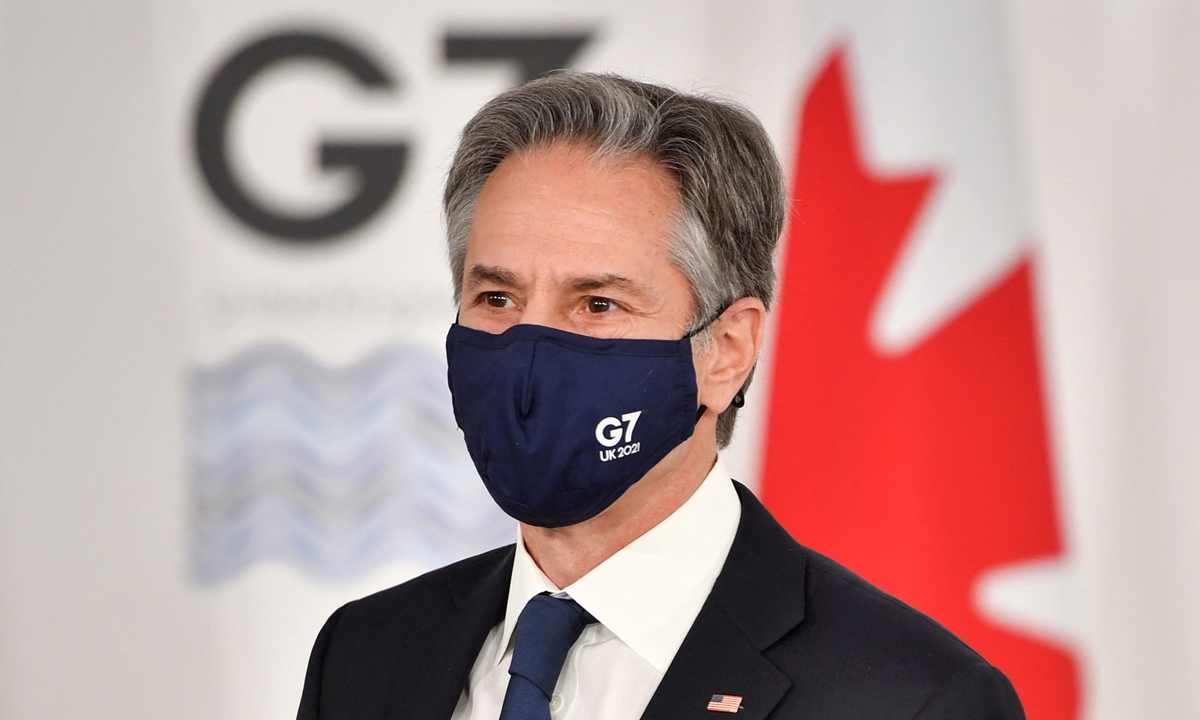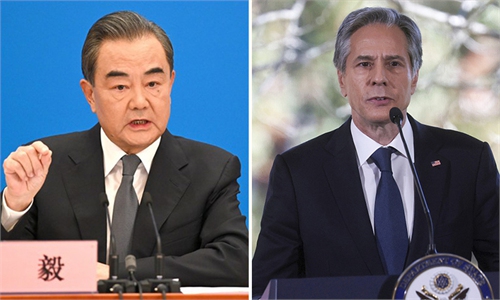US strengthens attempts to lure ASEAN
SE Asia knows US' bad record means it can't be trusted

US Secretary of State Antony Blinken, wearing a mask, arrives for a G7 Foreign and Development Ministers Session with Guest Countries and Association of Southeast Asian Nations member states on the final day of the G7 foreign ministers summit in Liverpool, England, on December 12, 2021. Photo: AFP
Realizing its inability to lure ASEAN members to its camp, the US is floating the idea of allying with Japan in an attempt to turn Southeast Asian countries against China, said analysts as top diplomats from Washington and Tokyo agreed on a G7 meeting to strengthen the deterrence and response capabilities of their countries' alliance to counter China in the Indo-Pacific region.
ASEAN has become what experts say the "key battlefield" of the geopolitical rivalry between the US and China. US Secretary of State Antony Blinken is heading to three ASEAN states to pursue what analysts predicted a "cliché peddling of China threat," to test the bloc's unified stance on AUKUS and talk about the Myanmar issue. However, those experts believe that as usual, the ASEAN members cannot be persuaded and will maintain its centrality in the China-US rivalry.
Meeting on Saturday on the sidelines of the two-day G7 foreign ministerial meeting in Liverpool, England, Japanese Foreign Minister Yoshimasa Hayashi and Blinken underscored the need to cooperate with ASEAN as well as like-minded nations such as Australia and India, a move to strengthen their countries' alliance in a defiance against China's influence in this region, media reported.
The two officials agreed it is "indispensable to bolster the deterrence and response capabilities of the alliance amid the increasingly harsh security environment," the Japanese foreign ministry said.
Dragging Japan into an alliance to force ASEAN to turn against China is considered a double "win" for both Washington and Tokyo, so the two have been plotting this plan for quite a long time, Chen Xiangmiao, an assistant research fellow at the National Institute for South China Sea Studies, told the Global Times on Sunday.
It will be a lot easier and cheaper for Washington to win ASEAN over with Japan's help but the alliance will wane due to the bloc's caution over being forced to choose sides, Chen said. "Because if Japan jumps in, it won't be the situation for choosing US or China," Chen said, noting that for Japan, it is more of an opportunity to project and strengthen its influence in this region.
Another goal of such an alliance is to reduce the bloc's economic dependence on China, Chen said.
The Regional Comprehensive Economic Partnership (RCEP), which includes Japan, South Korea, Australia, and New Zealand, will take effect on January 1, 2022, and the US still refuses to return to the Comprehensive and Progressive Agreement for Trans-Pacific Partnership, which includes several Southeast Asian countries.
"How can the US offset China's economic impact? This would be another important question for the US to worry about. Economic issues may be the US' most important future task in the Indo-Pacific," Chen said, noting that Washington now eyes Japan, a country which already has profound cooperation with the bloc for help to counter China's economic influence in this region.
Yet experts said that it is an almost impossible task. In 2020, ASEAN surpassed the EU to become China's largest trading partner for the first time in history. China has been ASEAN's largest trading partner for last 12 years. China is ready to provide ASEAN with another $1.5 billion in development assistance in the next three years to support ASEAN members' fight against COVID-19 and their economic recovery.
China has been Malaysia's largest trading partner for 12 consecutive years. And Malaysia, as the second-largest trading partner of China among ASEAN countries, needs to attract foreign investments, particularly from China, to help economic recovery due to the impact of the COVID-19 pandemic, Koh King Kee, President of the Center for New Inclusive Asia in Malaysia, told the Global Times on Sunday.
Blinken is scheduled to travel to Indonesia, Malaysia and Thailand from Monday to Thursday. High level US officials, including US Vice President Kamala Harris and Secretary of Defense Lloyd Austin, have made frequent visits to Southeast Asian countries.
According to the US Department of State website, topics of the Secretary of State's official visits will range from stressing the importance of partnership between the US and those countries, building resilient supply chains, post-pandemic economic recovery and addressing the Myanmar issue.
Blinken's trip is to further coerce ASEAN to take sides between China and the US, as it is growing wary as the bloc's relation with China is heating up recently, said experts.
This year marks the 30th Anniversary of China-ASEAN Dialogue Relations, with experts saying that China will further share its development profits with and open its market to ASEAN partners.
However, Koh said ASEAN will maintain as centrality in the China-US rivalry. "ASEAN members most probably will take their cue from US' recent chaotic withdrawal from Afghanistan without due consultation with its allies. In the eyes of many, the US is a self-centered superpower that cannot be trusted."
Chen said that the US' Indo-Pacific strategy has been a growing worry for ASEAN countries that see it as a destabilizing factor for regional peace, the most recent example being the AUKUS trilateral security partnership between the US, UK and Australia.
Koh told the Global Times previously that AUKUS is a US-led united front and an additional component of its Indo-Pacific Strategy to contain China, but no ASEAN country is likely to join the US-led "Asian NATO" in view of close trade ties with China.


